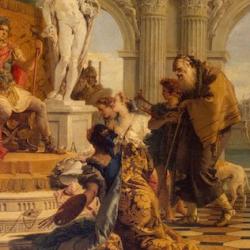Augustine famously presented a “privation” view of evil., Evil is not a substance but a privation of being. This does not mean that evil has no reality of any sort. It is simply not a created substance.
This account helps Augustine to locate the core of the corruption of the city of man. He traces civic evil to to ill will because it cannot be nature. And it cannot be nature because God is the author of nature and cannot be the author of anything evil. Will has to do with desires and loves, and therefore the cities are different in their different orientation of will and love.
This means that Augustine’s political “reductionism” is philosophically motivated. The two cities can’t differ in nature, since both share the same human nature. Evil will is what vitiates nature – it must be, Augustine thinks, because otherwise you blame God for evil or you say that an good man produced an evil will. Once this is established, then the two communities, societies must be distinguished by orientation of will. Augustine first establishes that evil will is the location of the difference between good and evil angels, and then moves on to show that it is the same for good and evil humans.
Augustine’s privation theory also makes it possible for him to think the possibility of redemption for the city of man. If evil were location in nature rather than will, then humanity would be without hope; human beings could not be redeemed and remain human. Because evil is located in will, and will can be changed by God without making men something other than men, they are redeemable. The whole possibility of the redemption of humanity rests on the reality of an originally good creation, and the confidence that evil is not woven in the fabric of things.
None of this minimizes the effect of evil in the cities of men. As Rusty Reno has noted, the rejection of a substantial view of evil does not mean that evil has no “reality” of any sort. This is precisely Augustine’s argument against the Pelagians: Pelagius says that evil cannot corrupt because a non-substance cannot have that kind of effect on substances. Augustine says, on the contrary, that absences can have powerful effects and are among the most powerful of social and political realities. Think of the personal and political havoc wreaked by an absence of food, for instance. For Augustine, “what is real” is no longer equated with “what is substantial.”










